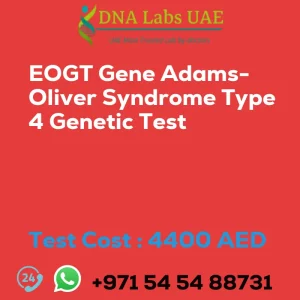IGF Binding Protein-3 (IGFBP-3) Test
Test Name: IGF BINDING PROTEIN – 3 IGFBP – 3 Test
Components: IGFBP-3
Price: 950.0 AED
Sample Condition: 2 mL (1 mL min.) serum from 1 SST. Ship frozen. DO NOT THAW.
Report Delivery: SampleMon / Thu by 11 am; Report Same day
Method: Chemiluminescent Immunoassay
Test Type: Disorders of Growth
Doctor: Endocrinologist
Test Department: DNA Labs UAE
Pre Test Information: No special preparation required
What is IGF Binding Protein-3 (IGFBP-3)?
IGF Binding Protein-3 (IGFBP-3) is a protein that binds to insulin-like growth factor (IGF) in the bloodstream. It regulates the availability and activity of IGF, which plays a crucial role in cell growth and development.
Why is the IGFBP-3 Test performed?
An IGFBP-3 test measures the level of IGFBP-3 in the blood. It is often performed along with IGF-1 testing to evaluate the overall IGF system function. The test is primarily used to assess growth hormone (GH) deficiency or excess, as IGFBP-3 levels are influenced by GH levels.
What do the results of the IGFBP-3 Test indicate?
Low levels of IGFBP-3 may indicate GH deficiency, malnutrition, liver disease, or chronic kidney disease. High levels may suggest GH excess, acromegaly (a condition where there is excessive growth hormone production), or certain types of cancer.
When is the IGFBP-3 Test ordered?
The IGFBP-3 test is typically ordered if a person is experiencing abnormal growth patterns, such as stunted growth or excessive growth, or if a doctor suspects a disorder related to the GH-IGF system. It is also used to monitor the effectiveness of GH therapy in individuals with GH deficiency.
How is the IGFBP-3 Test performed?
The test involves drawing a blood sample, usually in the morning when GH levels are highest. The sample is then sent to a laboratory for analysis. Results are usually available within a few days.
It is important to note that the IGFBP-3 test is just one part of the diagnostic process and should be interpreted in conjunction with other clinical findings and test results. A healthcare provider will assess the overall picture to determine the underlying cause of any abnormal IGFBP-3 levels.
| Test Name | IGF BINDING PROTEIN – 3 IGFBP – 3 Test |
|---|---|
| Components | |
| Price | 950.0 AED |
| Sample Condition | 2 mL (1 mL min.) serum from 1 SST. Ship frozen. DO NOT THAW. |
| Report Delivery | SampleMon / Thu by 11 am; Report Same day |
| Method | Chemiluminescent Immunoassay |
| Test type | Disorders of Growth |
| Doctor | Endocrinologist |
| Test Department: | |
| Pre Test Information | No special preparation required |
| Test Details |
IGF Binding Protein-3 (IGFBP-3) is a protein that binds to insulin-like growth factor (IGF) in the bloodstream. It regulates the availability and activity of IGF, which plays a crucial role in cell growth and development. An IGFBP-3 test measures the level of IGFBP-3 in the blood. It is often performed along with IGF-1 testing to evaluate the overall IGF system function. The test is primarily used to assess growth hormone (GH) deficiency or excess, as IGFBP-3 levels are influenced by GH levels. Low levels of IGFBP-3 may indicate GH deficiency, malnutrition, liver disease, or chronic kidney disease. High levels may suggest GH excess, acromegaly (a condition where there is excessive growth hormone production), or certain types of cancer. The IGFBP-3 test is typically ordered if a person is experiencing abnormal growth patterns, such as stunted growth or excessive growth, or if a doctor suspects a disorder related to the GH-IGF system. It is also used to monitor the effectiveness of GH therapy in individuals with GH deficiency. The test involves drawing a blood sample, usually in the morning when GH levels are highest. The sample is then sent to a laboratory for analysis. Results are usually available within a few days. It is important to note that the IGFBP-3 test is just one part of the diagnostic process and should be interpreted in conjunction with other clinical findings and test results. A healthcare provider will assess the overall picture to determine the underlying cause of any abnormal IGFBP-3 levels. |








